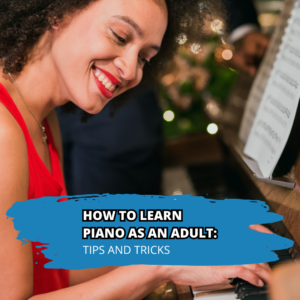How to Learn Piano as an Adult: Tips and Tricks

Starting your musical journey as an adult can be an enriching experience, especially when you understand how to learn piano effectively. Adults possess certain advantages such as self-discipline and a clearer understanding of their goals, which can significantly benefit their learning process. While the notion that children learn faster might be prevalent, adults have the ability to apply their life experiences and broader understanding towards mastering the piano.
By choosing appropriate methods tailored for adult learning, individuals can navigate through initial challenges with confidence. It’s important for adult learners to acknowledge and harness their unique strengths when learning piano. Exploring various genres and styles can also keep the learning experience exciting and personally meaningful.
Understanding the Unique Challenges for Adult Learners
Adults learning how to play the piano encounter a distinct set of challenges that differentiate their educational experience from younger learners.
Limited Time Availability
When considering how to learn piano as an adult, one of the foremost challenges is the limited time available for practice. Adults often juggle responsibilities such as work, parenting, or further education, which can impede consistent piano practice. Efficient practice sessions, possibly early in the morning or during lunch breaks, can be very effective.
It’s important to use time management tools like planners or apps to block out regular practice times. Short, focused sessions can yield more progress than sporadic, lengthy ones. Prioritizing quality over quantity in these moments can significantly enhance learning efficiency. Creating a dedicated practice space at home can also reduce setup time and help transition into the right mindset more quickly.
Previous Musical Experience
Many adult learners might feel intimidated by how to learn piano either because they have no musical background or because they are switching from another instrument. It’s crucial to start with the basics, such as learning note names, simple scales, and chords, regardless of past musical experience. Adults should leverage their learning capabilities to grasp theoretical concepts, which can accelerate the initial stages of learning piano.
For those with prior experience, it can be beneficial to compare the mechanics and theory of piano to their known instrument to create meaningful connections. It’s also helpful to acknowledge and use any musical ear training from past experiences to aid in faster note recognition and rhythm mastery.
Balancing Piano Practice with Daily Life
For adults, integrating piano practice into an already full schedule requires thoughtful planning and commitment.
Setting Realistic Practice Goals
For many adults, finding time to learn piano involves juggling various commitments. Setting realistic, achievable goals is crucial in maintaining progress without becoming overwhelmed. It’s advisable to begin with as little as 15 minutes of focused practice a day, gradually increasing the duration as one becomes more comfortable. Setting specific, measurable, and time-bound goals can help maintain a clear path forward and provide a sense of achievement that fuels further learning.
Techniques and Resources for Adult Piano Learners
The selection of suitable techniques and resources plays a pivotal role in facilitating a productive learning experience for adult piano students.
Incorporating Theory and Practice
To effectively learn how to play piano, adults should balance the practical aspects of playing with learning music theory. Understanding the theory behind music can significantly enhance the ability to read music, improvise, and compose. Start with the basics of music theory, including scales, chords, and rhythm, and gradually move to more complex concepts like harmony and counterpoint. Practical application of these theories during practice sessions can solidify this knowledge and make learning more comprehensive. Combining theory with practice not only improves technical skills but also deepens the musical experience.
Using Technology to Enhance Learning
Technology offers a wealth of resources that can facilitate how to learn piano. Apps and software provide interactive learning experiences that are flexible and engaging. Video tutorials can offer step-by-step guidance that adults can follow at their own pace. Digital metronomes and recording tools also help in maintaining rhythm and evaluating one’s playing style, providing feedback that is essential for improvement.
Staying Motivated Throughout the Learning Process
Maintaining motivation is critical for adults learning piano, as it fuels the long-term commitment necessary to achieve musical proficiency.
Celebrating Small Wins
Maintaining motivation is crucial when figuring out how to learn piano as an adult. It’s important to celebrate small victories along the way, such as mastering a tricky piece of music, playing a successful scale, or achieving a week of consistent practice. These milestones, however small, can provide a significant motivational boost. Setting up a reward system or sharing progress with friends, family, or a learning community can also reinforce positive feelings and encourage continued effort. Celebrating these successes helps sustain interest and commitment to the learning process, making the journey more enjoyable and less daunting.
Engaging with the Piano Community
Joining a community of fellow learners can significantly enhance your motivation and provide support. Many cities offer community music groups or workshops where adult learners can share experiences and challenges. Online forums and social media groups also provide platforms where one can ask questions, share achievements, and even collaborate remotely. Engaging with the piano community not only helps in staying motivated but also enriches the learning experience by exposing one to diverse perspectives and techniques.
Why Choose Elite Music Academy?
We offer tailored piano lessons that are specifically designed to cater to individuals of all skill levels, from beginners to those wishing to refine their technique. Our experienced instructors are skilled in various teaching methods that effectively address the learning styles and preferences of all. By joining our community, you gain access to a supportive environment that encourages musical growth and personal development. Elite Music Academy is committed to making the journey of learning piano accessible and enjoyable for all! Check out the reviews from our wonderful community!
FAQs
1. What type of piano is best for adult beginners?
Digital pianos are a good choice for beginners due to their affordability, low maintenance, and volume control.
2. What is the best way to track progress when you are figuring out how to learn piano?
Track progress by setting specific benchmarks, using recording tools to monitor improvements, and regularly reviewing and adjusting goals.
3. Can you recommend specific types of music or songs that are good for adults learning how to learn piano?
Beginners should start with simple pieces that align with their musical tastes, such as classical minuets, pop ballads, or jazz standards, to keep the learning process enjoyable and engaging.
4. What are some common mistakes adults make when starting to learn piano and how can they avoid them?
Common mistakes include neglecting theory, rushing through lessons, and irregular practice. Avoid these by balancing theory with practice, moving at a comfortable pace, and maintaining a regular practice schedule.
5. Can group classes be effective for adults learning how to learn piano?
Yes, group classes offer peer learning opportunities, motivation from group dynamics, and exposure to varied techniques and styles.






